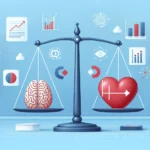Understanding the Relationship Between IQ Scores and Emotional Regulation
The intricate dance between intelligence and emotions has been a subject of fascination for psychologists and educators alike. Within this spectrum lies the concept of IQ, or Intelligence Quotient, a score derived from standardized tests designed to measure human intelligence. This numerical measurement, often considered a marker of cognitive abilities such as logic, problem-solving and abstract reasoning, is paralleled by another critical dimension of our psyche – emotional regulation. But how do these two aspects of human behavior relate to each other? Are those with higher IQ scores better at managing their emotions, or is the correlation not as straightforward? Let’s delve into the connection between IQ scores and emotional regulation to uncover the layers of this relationship.
IQ and Emotional Intelligence: Two Sides of the Cognitive Coin
To tease apart the interaction between IQ and emotional regulation, it’s imperative to introduce the concept of Emotional Intelligence (EQ). EQ refers to the ability to perceive, control, and evaluate emotions – both in oneself and in others. It encompasses skills such as empathy, emotion management, and social awareness. While IQ tests are unable to directly measure emotional skills, EQ assessments fill this gap, giving us a framework to consider how cognitive intelligence may relate to emotional processes.
Research has suggested that EQ and IQ are distinct yet correlated constructs. In other words, while they represent different skill sets, there is often some level of association between them. However, this relationship is complex and influenced by a variety of factors such as personality, environment, and upbringing. Although some studies have indicated that individuals with higher IQ scores may find it easier to apply cognitive strategies towards emotion regulation, this is by no means a universal rule.
The Complexity of Emotional Regulation in Relation to IQ
Emotional regulation involves the ability to monitor, evaluate, and modulate one’s emotional reactions to various situations. It is crucial for psychological well-being and social functioning. While it might be tempting to assume that higher IQ individuals possess better emotional control due to their potentially greater cognitive resources, emotional regulation is not solely reliant on intelligence. It is also shaped by experiences, social context, and even biological factors.
Factors such as stress, social support, and mental health can greatly influence an individual’s ability to regulate emotions, independent of IQ. Thus, a high IQ score does not automatically equate to superior emotional regulation. In fact, some high-IQ individuals may struggle with emotions, as traditional IQ tests do not measure coping mechanisms, resilience, or adaptability.
The Role of Education and Training
Importantly, both IQ and emotional regulation can be developed and enhanced through targeted interventions. Educational programs designed to bolster emotional intelligence can be beneficial, teaching individuals strategies for managing emotions more effectively. Practical exercises focusing on self-awareness, mindfulness, emotional recognition, and coping strategies can be useful tools for everyone, regardless of their cognitive intelligence level.
Conclusion
In the intertwined story of IQ scores and emotional regulation, it becomes clear that while there may be some relationship between the two, it is far from simple or predictive. Intelligence, as defined by traditional IQ metrics, does not capture the full breadth of emotional skills and abilities that contribute to effective emotion regulation. To truly understand and foster better emotional control, we need to look beyond IQ scores and incorporate a broader range of educational and psychological approaches, underpinning the principle that intelligence is multifaceted and extends well beyond a single score.
As we continue to uncover the intricate ways in which cognitive and emotional processes are linked, it remains important to appreciate the unique contributions of both IQ and EQ in the tapestry of human behavior. Embracing this complexity can lead to more nuanced and effective strategies for personal development, mental health, and overall well-being.

